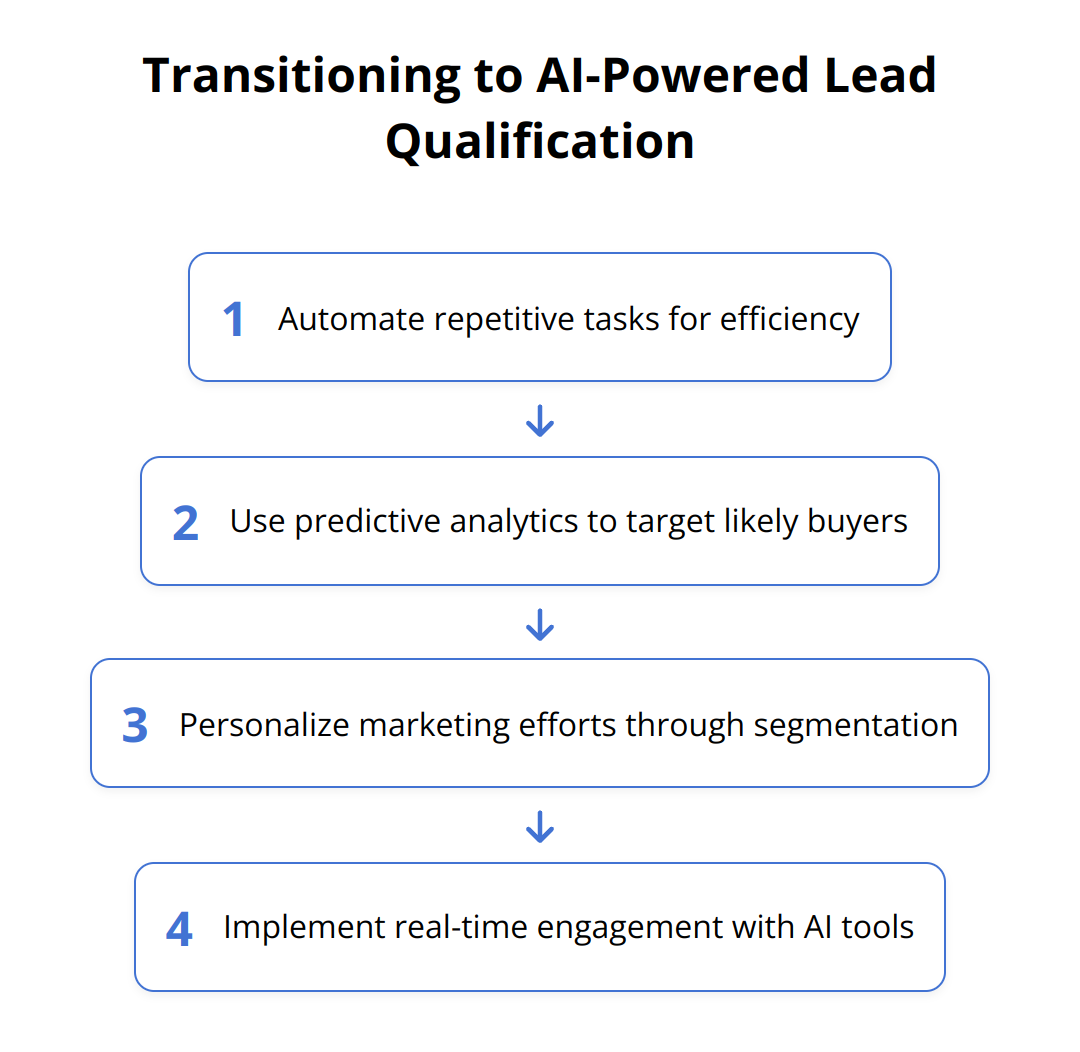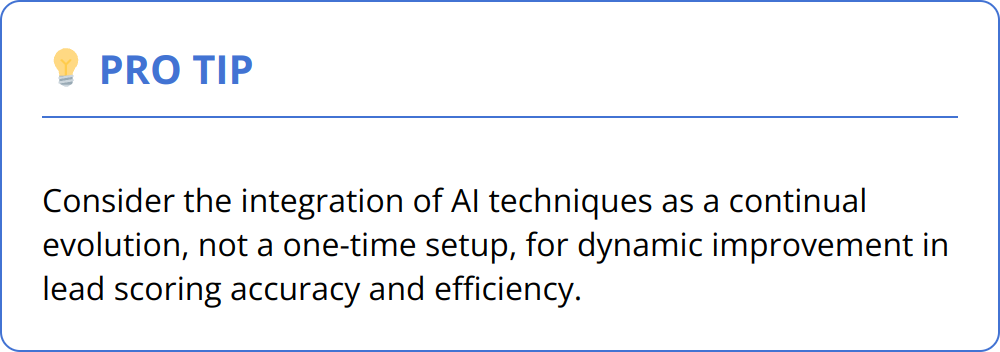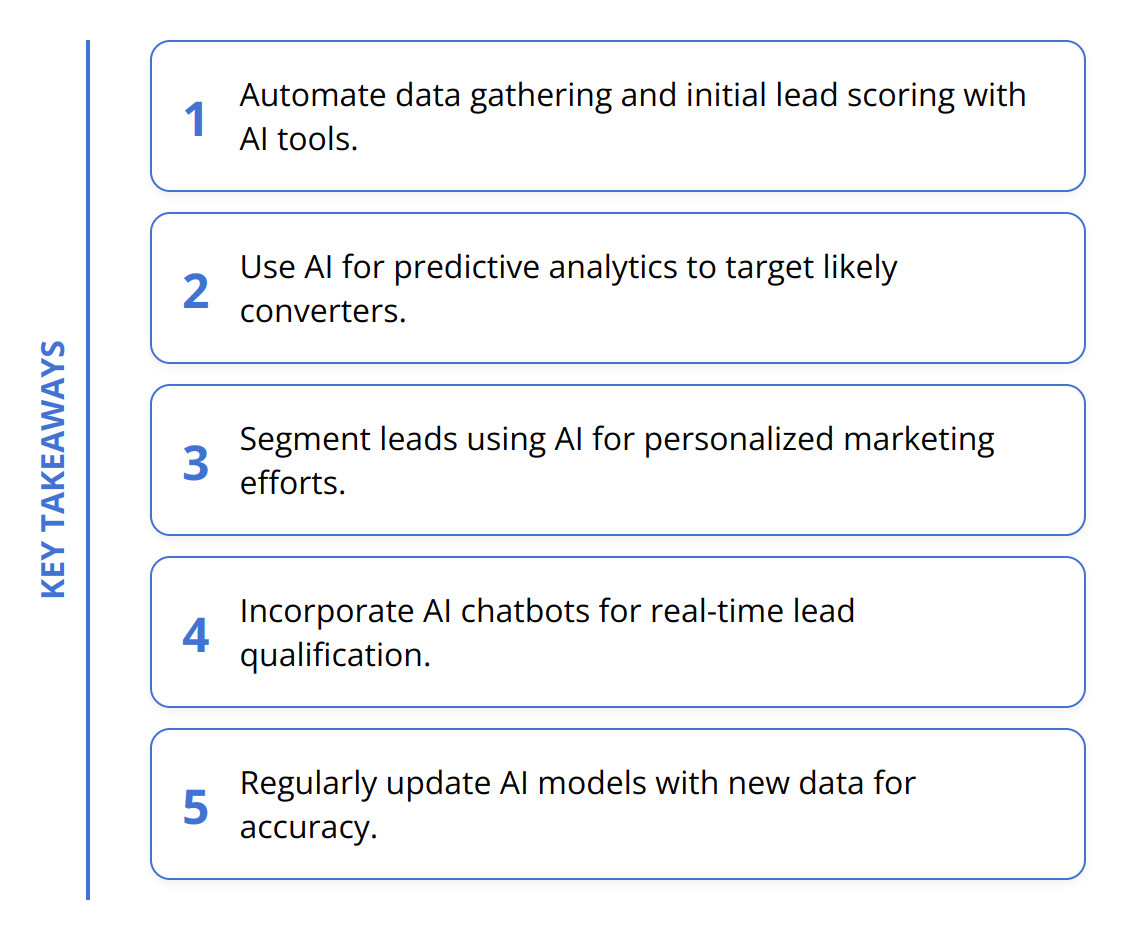We at Emplibot believe in the transformative power of AI in revolutionizing how businesses qualify leads. The right tools and techniques can set the stage for more conversions and higher efficiency. Understanding AI’s role in this process marks the beginning of a significant improvement in sales and marketing strategies. This post aims to guide you through the essentials of AI-powered lead qualification, offering practical advice on implementation and optimization.
Contents
ToggleAI and Lead Qualification
Lead qualification is a pivotal step in the sales process, determining which prospects are worth the time and effort of your sales team. Properly identifying potential customers who are more likely to make a purchase not only saves time but also significantly boosts the likelihood of closing deals.
AI’s Role in Enhancing Lead Qualification
The integration of AI into lead qualification processes has been a game-changer. Unlike traditional methods that rely heavily on manual analysis and gut feeling, AI-powered techniques leverage data and machine learning algorithms to assess a lead’s potential more accurately and efficiently. For instance, AI can analyze a prospect’s interaction with your website, social media engagements, and response to marketing campaigns, providing a more comprehensive and objective view of their readiness to buy.

Making the Shift: Traditional vs. AI-Powered Techniques
Transitioning from traditional lead qualification methods to AI-powered techniques is not just an upgrade; it’s a major shift towards more strategic, data-driven decision-making. Here are some practical insights into making this shift:
-
Automate repetitive tasks: Implement AI tools to handle the repetitive, time-consuming tasks of gathering data and initial lead scoring. This will allow your sales team to focus on engaging with more qualified prospects.
-
Use predictive analytics: AI can predict which leads are most likely to convert into customers based on historical data. By focusing on these leads, your efforts become more targeted, increasing your conversion rates.
-
Personalize your approach: AI tools can segment your leads based on various criteria, including behavior and demographics. This segmentation enables highly personalized marketing efforts, which are more likely to resonate with your prospects.
-
Implement real-time engagement: Utilize AI chatbots or messaging apps for instant engagement. These tools can qualify leads in real-time, providing immediate insights into which prospects should be moved forward in the sales funnel.

For those interested in implementing these strategies, exploring AI tools tailored for lead qualification is a critical first step. Reading about AI in marketing automation and leveraging AI for lead generation can provide deeper insights and practical tips to get started.
In conclusion, embracing AI for lead qualification means adopting a more efficient, accurate, and data-driven approach to identifying potential customers. The benefits of this transition extend beyond time savings, offering improved conversion rates and a better understanding of your prospects. As the sales landscape continues to evolve, staying ahead in this area will be key to maintaining a competitive edge.
Advancing Lead Scoring with AI
The evolution of AI has been pivotal in enhancing the effectiveness of lead scoring, transitioning from basic data analysis to complex, predictive capabilities. At the heart of this transformation are several core techniques that businesses should integrate to stay ahead in a competitive landscape.
Embrace Machine Learning for Dynamic Scoring
Machine learning stands out by its ability to continually learn from new data. Incorporating this into lead scoring means your system becomes smarter over time, adjusting to changes in customer behavior or market trends. Here’s how you can leverage it:
-
Start with clean, comprehensive data. The accuracy of machine learning predictions depends on the quality of the data fed into it.
-
Define clear goals. Knowing what you aim to achieve helps in designing a model that focuses on the right indicators.
-
Continuously update your model. As new data comes in, ensure your system integrates this to refine future predictions.
Harness Natural Language Processing for Deeper Insights
Natural Language Processing (NLP) goes beyond basic data points, analyzing the way potential customers communicate with your brand. This can include interactions on social media, customer reviews, or responses to marketing emails. Here’s why NLP is invaluable:
-
It identifies customer intent. Understanding whether a lead is just browsing or showing serious purchase intent helps prioritize efforts.
-
It enhances personalization. By analyzing a lead’s language, you can tailor communications to match their needs and concerns more closely.
-
It segments more effectively. NLP can uncover nuanced differences in lead behavior, allowing for more precise segmentation.
Predictive Analytics: Forecasting Conversion Probabilities
The power of predictive analytics lies in its ability to use historical data to forecast future actions. Implementing predictive analytics into your lead scoring system offers a clear path to focusing on the leads most likely to convert. Adopting this approach requires:
-
An analysis of historical data. Look for patterns that have historically led to conversions.
-
The development of predictive models. These models estimate the likelihood of leads converting based on their alignment with these patterns.
-
Regular refinement. As with machine learning, your predictive analytics models should evolve based on new data and outcomes.

Bringing It All Together
Integrating these AI techniques into your lead scoring processes isn’t just about adopting new technology. It’s about fundamentally improving how you identify, understand, and engage with potential customers. By doing so, businesses not only streamline their sales processes but also significantly enhance their conversion rates.

For further reading on leveraging AI in your marketing and sales strategy, consider exploring insights on AI for market research and AI-driven sales predictions. These resources can provide additional context and practical tips for applying AI technologies to refine your lead qualification and scoring strategies.
Elevating Lead Qualification with AI
Integrating artificial intelligence (AI) into your lead qualification process can transform your business’s approach to finding and nurturing potential customers. By leveraging AI tools in conjunction with your Customer Relationship Management (CRM) systems, training your team on AI applications, and committing to continuous improvement, you can substantially increase the efficiency and effectiveness of your sales efforts.
Syncing AI with Your CRM
The strength of AI in lead qualification lies in its ability to analyze large datasets quickly and accurately. When AI tools are integrated with CRM systems, they can provide real-time insights about leads, enabling more personalized and timely interactions. Here are some practical steps to achieve this integration:
-
Select AI tools that seamlessly integrate with your current CRM system to avoid data silos.
-
Automate data entry and updates to ensure your CRM always has the most accurate information.
-
Set up AI-driven alerts for important lead activities that warrant immediate attention from your sales team.
Incorporating AI tools that complement your CRM can lead to better lead prioritization, ensuring your team focuses on the prospects most likely to convert.
Training Teams on AI Application
Adopting AI tools requires a shift in how your team interacts with technology and data. Effective training ensures your team can leverage AI to its full potential:
-
Organize workshops on the basics of AI and how it applies to lead qualification.
-
Provide real-life examples of successful AI implementation in lead qualification to illustrate its benefits.
-
Encourage hands-on practice with AI tools to build confidence and proficiency amongst your team members.
By fostering an AI-literate culture, your team can more effectively harness AI’s power in streamlining lead qualification processes.
Committing to Continuous Improvement
The digital landscape and consumer behaviors are always evolving, making it imperative for AI-driven systems to adapt. Continuous improvement in your AI strategies is key to keeping pace with these changes:
-
Regularly review AI tool performance and tweak strategies as needed.
-
Stay informed on AI and CRM technology advancements to ensure your tools and techniques remain state-of-the-art.
-
Gather feedback from your team on AI tool usability and effectiveness to identify areas for improvement.
Incorporating AI into your lead qualification processes is not a set-and-forget solution but a continuous journey toward optimization and adaptation.
Implementing AI for lead qualification can result in more efficient identification and nurturing of potential customers, ultimately leading to improved conversion rates and sales productivity. The integration of AI with CRM systems, coupled with thorough team training and a commitment to ongoing improvement, provides a solid foundation for leveraging AI in today’s competitive business environment.
For detailed insights on integrating technology into your sales strategy, explore CRM systems and AI and sales funnel automation. These resources offer practical advice on adopting and optimizing AI for lead qualification.
Final Thoughts
Advancements in AI have significantly reshaped the landscape of sales and marketing, particularly in the realm of lead qualification. By automating the tedious and complex process of qualifying leads, businesses stand to gain not only in terms of efficiency but also in accuracy and depth of insight. Embracing AI-powered lead qualification techniques is not just about keeping up with technology trends; it’s about fundamentally enhancing the way businesses interact with potential customers.

Key takeaways from our exploration into AI-powered lead qualification include the incredible efficiency gains from automating data-driven tasks, the precision of predictive analytics, the personalization made possible through advanced segmentation, and the real-time engagement capabilities of AI conversational tools. These elements together form a powerful toolkit for improving conversion rates and driving sales productivity.
Looking ahead, the future of AI in sales and marketing appears bright and ever-evolving. AI’s role is set to expand further, encompassing more sophisticated predictive models, deeper integration with CRM systems, and even more personalized customer interactions. This ongoing evolution promises to unlock new potentials for understanding and engaging with customers, ultimately revolutionizing sales strategies.
For businesses poised to adopt AI techniques, the message is clear: the sooner you integrate AI into your sales and marketing operations, the sooner you’ll reap the benefits of greater efficiency and effectiveness. With the pace at which AI technologies are advancing, staying ahead means making a proactive effort to adopt, adapt, and innovate.
For those interested in leveraging AI not just for lead qualification but across their marketing strategies, Emplibot offers an invaluable tool. By publishing SEO-friendly articles to your WordPress site automatically, including keyword research, images, and internal linking, Emplibot helps businesses build their blog effortlessly. This kind of automation in content creation is just a glimpse of how AI can streamline and enhance marketing efforts, allowing teams to focus on strategy and customer engagement.
In sum, the integration of AI into sales and marketing is not a fleeting trend but a fundamental shift towards data-driven, efficient, and personalized business operations. The potential for AI to transform lead qualification and beyond is immense, offering a competitive edge to those willing to invest in these technologies. As the digital landscape continues to evolve, AI-powered tools and techniques will undoubtedly play a critical role in shaping the future success of businesses worldwide.










 Rated Excellent 4.5
Rated Excellent 4.5